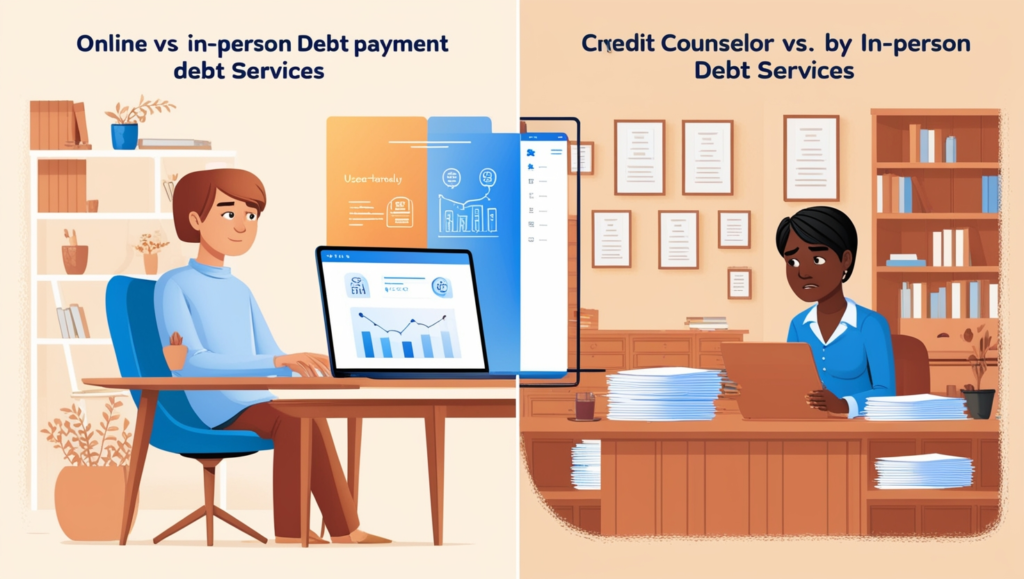Debt consolidation services offer a practical solution for individuals struggling to manage multiple debts. By consolidating various debts into a single loan or repayment plan, these services can simplify your finances and potentially reduce monthly payments. However, it is important to understand the various options available, including federal student loan consolidation and the differences between online and in-person services. Additionally, there are potential risks involved, such as higher interest rates or hidden fees, which must be carefully considered. This article will guide you through key aspects of debt consolidation, including eligibility requirements, potential fees, and the impact on your credit score. It will also help you compare the pros and cons of online versus in-person debt consolidation services. Ultimately, our goal is to help you make informed decisions about the best way to consolidate your debts and regain financial stability.
Key Benefits of Debt Consolidation Services
Debt consolidation services offer significant advantages for individuals struggling to manage multiple loans and credit card debts. These services simplify your financial situation and may also improve your financial health in the long term. Here are some key benefits to consider when looking for the debt consolidation services.
Simplified Payments
One of the primary benefits of debt consolidation is the simplification of your payments. Rather than keeping track of multiple due dates, interest rates, and amounts owed, you can consolidate all your debts into one single monthly payment. This streamlines your financial management, making it easier to stay on top of your obligations. With fewer payments to manage, the chance of missing a due date or overlooking a debt significantly decreases. This simplicity reduces the mental burden of managing various debts and allows you to focus on other aspects of your financial life.
Lower Interest Rates
Another major advantage of debt consolidation is the potential to secure a lower interest rate on your consolidated loan. Many individuals have credit cards or personal loans with high interest rates. By consolidating these debts into a single loan, you may be able to lower your overall interest rate. Debt consolidation loans often offer more favorable rates compared to the combined rates of individual credit cards or loans, especially if you have a good credit score. This reduction in interest rates can help you save a significant amount of money over time, as less of your monthly payment goes toward paying interest.
Improved Cash Flow
Debt consolidation can improve your cash flow by reducing your monthly payment obligations. With lower interest rates and a simplified payment plan, you may find that your monthly payments are smaller than before. This, in turn, frees up more money that can be directed toward other financial goals, such as saving for retirement, investing in your future, or paying for emergency expenses. By increasing the cash available each month, you gain more control over your finances and can begin to make progress toward achieving your financial objectives.
Reduced Stress
Managing multiple debts can be a source of significant stress and anxiety. Keeping track of due dates, interest rates, and balances on various credit cards and loans can feel overwhelming. Debt consolidation offers a path to reduce this stress by simplifying the process. With a single loan and a fixed monthly payment, you no longer need to juggle several debts. This reduction in complexity can alleviate anxiety and provide peace of mind. Knowing that you have a clear, manageable plan in place for paying off your debt can be a huge relief, and it may contribute to an overall sense of financial well-being.
How Debt Consolidation Helps Improve Financial Stability
When considering debt consolidation services, it is crucial to understand how they contribute to improving overall financial stability. By consolidating debt, you can make a clear plan for becoming debt-free. Many consolidation services offer budgeting tools, financial counseling, and other resources to help you stay on track with your repayment plan. Moreover, reducing the total number of debts you owe can improve your credit score over time, as long as you continue to make timely payments on the consolidated loan.

Debt Consolidation Loans vs. Credit Counseling or Debt Management Plans
When facing financial challenges, understanding the differences between debt consolidation services, credit counseling, and debt management plans can help you choose the best solution. Although all three aim to manage or reduce debt, their strategies differ significantly.
Debt Consolidation Loans: A Proactive Approach
A debt consolidation loan involves taking out a new loan to pay off existing debts. This approach consolidates multiple debts into one manageable payment. Often, these loans come with lower interest rates than those of credit cards or personal loans, which can result in substantial savings over time.
Debt consolidation loans offer a clear advantage for individuals aiming for faster debt repayment. By reducing the total interest paid and simplifying payments, this strategy can help streamline your finances. However, to qualify for the best rates, a good credit score is usually required. Additionally, this option may not address underlying issues, such as poor spending habits or a lack of budgeting skills.
Credit Counseling: A Holistic Approach
Credit counseling provides guidance on managing your finances effectively. This service typically involves working with a trained credit counselor who offers advice on budgeting, debt reduction strategies, and financial planning. Unlike a debt consolidation loan, credit counseling doesn’t involve taking on new debt.
This approach is ideal for individuals seeking long-term financial health. Credit counseling helps identify the root causes of debt problems and empowers individuals with tools to prevent future financial issues. While it doesn’t directly reduce interest rates or debt balances, it focuses on improving financial literacy and habits.
Debt Management Plans: A Structured Solution
A debt management plan (DMP) is a service provided by credit counseling agencies. It involves negotiating with creditors to secure lower interest rates or monthly payments. Under a DMP, you make a single monthly payment to the credit counseling agency, which then distributes the funds to your creditors.
This structured approach is effective for those struggling to meet their minimum payments or at risk of defaulting. Unlike debt consolidation loans, a DMP does not require taking on additional debt. However, enrolling in a DMP may temporarily affect your credit score, as creditors may report the arrangement to credit bureaus. Additionally, completing a DMP typically takes three to five years, requiring commitment and discipline.
Choosing the Right Option
When deciding between these approaches, consider your financial goals, credit score, and ability to repay. A debt consolidation loan may suit those with good credit and manageable debt levels. Credit counseling is beneficial for long-term improvement, while a DMP offers structured relief for those overwhelmed by payments.
For more information, explore resources from trusted organizations offering debt consolidation services, such as the National Foundation for Credit Counseling (NFCC) and government programs like USA.gov’s Debt Help.

Factors to Consider When Selecting a Debt Consolidation Company
When considering debt consolidation services, it’s essential to evaluate several factors before choosing the right company. Your financial situation is personal, and selecting the wrong service can lead to further financial complications. Here are the key factors to consider when selecting a debt consolidation company:
1. Reputation and Experience
Reputation and experience are critical when selecting a debt consolidation company. A reputable company will have a proven track record of successfully helping clients consolidate their debt. Look for companies with positive reviews, testimonials, and industry certifications. Trusted organizations like the National Foundation for Credit Counseling (NFCC) or Financial Counseling Association of America (FCAA) can guide you toward reputable providers. Companies with extensive experience typically have the expertise needed to navigate complex financial situations.
Research the company’s history and the duration they’ve been in business. A longer-established company is likely to have honed its services and developed a reliable process for managing debt consolidation.
2. Fees and Charges
Understanding the fees and charges associated with debt consolidation is crucial. Debt consolidation companies may charge upfront fees, monthly service fees, or closing costs. These charges can vary widely, so it’s important to get a complete breakdown of all potential fees before committing.
Look for a company that is transparent about its costs and avoid companies that advertise “no fees” but require you to pay hidden charges down the line. Ensure you know exactly what you’re being charged for and whether these costs are reasonable for the services provided. Some companies may even offer free consultations to help you understand their pricing structure.
Be wary of high upfront fees that could erode the financial benefits of consolidating your debts. It’s essential to balance cost with the quality of services offered. For example, some reputable providers offer low or no upfront fees but may charge slightly higher monthly service fees, which can still be a better option overall.
3. Customer Service
Excellent customer service is another vital factor to consider. Managing your debts can be stressful, so you want a company that is responsive, empathetic, and ready to help you through each step of the process. Look for companies that provide clear communication, easy access to customer support, and ongoing assistance if any issues arise.
You should feel comfortable asking questions and addressing any concerns you have about your consolidation plan. A company that offers attentive and proactive customer service can make the process smoother and reduce the anxiety associated with managing your finances.
4. Transparency
Transparency is essential in the debt consolidation industry. The company should clearly explain its processes, fees, and what you can expect from the services. Be cautious of companies that are vague about how they operate or the potential risks involved in debt consolidation.
A trustworthy company will take the time to thoroughly explain your options, the consolidation process, and the terms of any loans or agreements. They should provide you with all the details you need to make an informed decision about whether consolidation is the best option for your financial situation.
Before committing to any provider, ask them to walk you through their process in detail. Reputable companies will gladly provide clear, detailed explanations to ensure you understand every aspect of the service. Always ask for written agreements, and be sure to review them thoroughly before signing.
5. Financial Health of the Company
It’s important to assess the financial health of the debt consolidation company you’re considering. The company should be stable enough to deliver on its promises and meet your financial needs. Research the company’s financial standing through reviews, ratings, and reports from independent third-party agencies like the Better Business Bureau (BBB).
A financially stable company will be better equipped to provide ongoing support and maintain its services over time. You want to ensure that the company is financially sound enough to handle your debt consolidation and that it can sustain its operations throughout the duration of your agreement.
You can also research whether the company is registered and complies with relevant financial regulations. This ensures that it adheres to ethical standards and offers services that align with consumer protection laws.

Types of Debts That Can Be Consolidated
Debt consolidation services are an effective tool for managing and simplifying various types of debt. Consolidating multiple debts into one loan or payment plan can help reduce financial stress and make it easier to stay on top of payments. Below are the common types of debts that can typically be consolidated:
1. Credit Card Debt
Credit card debt is one of the most common types of debt people consolidate. Credit cards often come with high interest rates, which can make it difficult to pay off balances over time. By consolidating credit card debt into a single loan, you can potentially lower your interest rate and reduce the total amount of interest you pay. Debt consolidation services may offer better terms than those of individual credit cards, making it easier to manage payments.
2. Personal Loans
Personal loans, like credit card debt, can also be consolidated through a debt consolidation service. These loans can be used for a variety of purposes, such as home improvement or unexpected expenses. However, if you have multiple personal loans with varying interest rates, consolidating them into one loan with a lower rate could save you money. This is particularly useful if you are struggling to keep track of multiple loan payments each month.
3. Medical Bills
Medical expenses can quickly accumulate, often resulting in high levels of debt. Many people find themselves with medical bills that they cannot pay off immediately. Debt consolidation services can help by consolidating medical bills into a single payment, sometimes at a lower interest rate. This can provide relief to individuals who are burdened by high medical costs, particularly in the case of major surgeries or extended treatments. Consolidating medical debt makes it easier to manage payments without risking default or additional fees.
4. Home Equity Loans
Home equity loans are loans secured by the value of your home. While these loans often have lower interest rates compared to unsecured debt, they still add to the total debt burden. Debt consolidation services can consolidate home equity loans with other debts to simplify your payments. It’s essential to weigh the pros and cons carefully, as consolidating secured loans like home equity loans could impact your home if you miss payments. However, consolidating them into a manageable loan can help you avoid late fees and interest rate hikes.
Risks Involved in Consolidating Debt and How to Avoid Pitfalls
Debt consolidation can offer significant advantages, such as simplified payments and potentially lower interest rates. However, it’s important to understand the risks involved. While debt consolidation services can help you manage your debt more effectively, they may not always be the perfect solution for everyone. By being aware of potential pitfalls, you can make a more informed decision and avoid common mistakes.
1. Higher Total Interest
One of the key risks of debt consolidation is the possibility of paying more interest over time. This can happen if the repayment term is extended. While a debt consolidation loan might reduce your monthly payment by offering a lower interest rate, it could also stretch out the repayment period. This longer term can result in higher overall interest costs, even if your monthly payments are more affordable.
For example, if you consolidate high-interest credit card debt into a lower-interest loan with a term of 10 years, you may end up paying more in total interest despite a lower interest rate. It’s important to calculate how much interest you will pay over the entire term of the consolidation loan and compare it to the interest you would pay on your original debts. Consider whether it’s worth it to extend the loan term in exchange for lower monthly payments.
2. Difficulty Qualifying for a Loan
Another potential downside is that not everyone qualifies for a debt consolidation loan. These loans typically require a good credit score, a stable income, and a manageable level of debt. If your credit score is low, you may not be able to secure a consolidation loan with favorable terms. In some cases, you might not qualify for a loan at all.
Even if you do qualify, the interest rate you receive may not be as low as you had hoped. It’s essential to assess your creditworthiness and shop around for the best loan terms before moving forward with a debt consolidation plan. Some debt consolidation services offer alternatives, such as debt management plans or credit counseling, which may be a better option if you’re unable to secure a loan.
3. Potential for Overspending
Debt consolidation doesn’t address the root cause of your debt problems. If overspending was the reason you accumulated debt in the first place, consolidating your debts into a single payment might seem like a quick fix, but it won’t prevent you from getting back into debt. Without changing your spending habits, you may find yourself accumulating new debts after consolidation, worsening your financial situation.
In fact, the relief you feel from consolidating debt could lead to a false sense of security, tempting you to use credit cards or take out loans again. If you don’t take proactive steps to manage your finances, you may end up in a cycle of debt. It’s crucial to understand that debt consolidation is just one part of the solution, and it doesn’t address the financial habits that caused the problem in the first place.
How to Avoid Pitfalls
While there are risks associated with debt consolidation, there are also strategies you can employ to avoid common mistakes and make the process work for you.
1. Address the Root Cause of Your Debt
To prevent the cycle of debt from repeating, take the time to address the underlying causes of your financial challenges. Identify why you overspent in the first place. Is it due to impulse spending, lifestyle inflation, or lack of budgeting? Once you have a clear understanding of the cause, you can work to change your behavior and improve your financial habits.
By addressing these root causes, you’ll be less likely to fall back into debt after consolidating. Consider seeking professional advice from a financial counselor or credit advisor to help you identify areas for improvement and establish a sustainable financial plan.
2. Create a Realistic Budget
A well-structured budget is essential for long-term financial stability. After consolidating your debts, create a realistic budget that accounts for all your expenses, savings goals, and debt repayment obligations. Track your spending carefully and ensure that you’re living within your means. Sticking to your budget can help you avoid overspending and provide the discipline necessary to keep your finances on track.
There are many tools available to help you create and manage a budget, such as budgeting apps or spreadsheets. Make sure your budget is both realistic and flexible enough to accommodate any unexpected expenses.
3. Seek Professional Advice
Consulting with a financial advisor or credit counselor can provide valuable insights and help you make the best decision. These professionals can assess your financial situation and recommend the most effective debt management strategies. A credit counselor can help you understand the debt consolidation process and guide you toward reputable debt consolidation services.
Seeking professional advice ensures that you make informed decisions, avoid common pitfalls, and create a plan that’s aligned with your financial goals. Financial advisors can also help you build a roadmap for staying out of debt in the future.

Eligibility Requirements for a Debt Consolidation Loan
When considering a debt consolidation loan, several key factors can influence your eligibility. These factors help lenders assess your financial stability and determine whether you can afford the loan. Below are the most common requirements you should be aware of:
1. Credit Score
Your credit score plays a significant role in determining your eligibility for a debt consolidation loan. Lenders typically look for a good credit score, as it indicates a history of responsible borrowing and repayment. A higher score improves your chances of approval and may qualify you for more favorable loan terms, such as a lower interest rate. If your score is lower, you may still qualify, but you might face higher rates or be required to provide collateral.
2. Income and Debt-to-Income Ratio
Lenders will also evaluate your income to ensure you have enough financial resources to repay the loan. They will look at your monthly income and compare it to your total debt payments. This is known as your debt-to-income (DTI) ratio. A lower DTI ratio suggests that you are not overburdened with debt and can manage additional loan payments. Generally, a DTI ratio of 36% or lower is considered ideal for debt consolidation eligibility.
3. Employment Stability
Having a stable job history can strengthen your debt consolidation loan application. Lenders prefer applicants who have consistent employment, as it indicates reliability and the ability to make regular payments. A steady income stream assures lenders that you can handle the monthly payments on the loan. If you have recently changed jobs or have an unstable work history, it could impact your chances of approval.
Impact of Debt Consolidation on Credit Score
Debt consolidation can have both short-term and long-term effects on your credit score. Understanding these impacts can help you make an informed decision about whether debt consolidation is the right option for you.
Short-Term Impact
In the short term, taking out a new debt consolidation loan can cause a temporary dip in your credit score. This is because most lenders perform a hard inquiry (also known as a hard pull) on your credit report when you apply for a loan. This inquiry might cause a slight decrease in your score, typically by a few points. While this drop is usually brief, it can be a concern for those planning to apply for additional credit in the near future.
However, the impact of a hard inquiry on your credit score is usually minimal, and the score tends to recover quickly. The key is ensuring that you stay on track with your payments after consolidation, as timely payments will help improve your score over time.
Long-Term Impact
In the long run, successful debt consolidation can have a positive effect on your credit score. One of the primary ways this happens is through the reduction of your credit utilization ratio. Credit utilization is the percentage of your available credit that you are using. Consolidating your debts into a single loan can lower your overall credit utilization, which in turn can improve your score. A lower credit utilization ratio signals to lenders that you are managing your credit responsibly, which can have a positive impact on your creditworthiness.
Additionally, consolidating your debts can improve your payment history. By combining your debts into one loan, you’ll have a single payment to make each month. This can help you stay on top of payments and avoid missing deadlines. Since payment history is one of the most significant factors affecting your credit score, consistently making on-time payments can help boost your sc
Fees and Hidden Costs in Debt Consolidation
Debt consolidation services can provide a much-needed solution for those struggling with multiple debts. However, before you move forward with consolidating your debts, it’s essential to be aware of potential fees and hidden costs that could impact your financial situation. These charges may vary depending on the lender or service you choose, so understanding them upfront can help you make an informed decision.
Origination Fees
One of the most common fees associated with debt consolidation is the origination fee. This is a one-time fee that lenders charge to process and approve your loan. The amount of the origination fee can vary, but it typically ranges from 1% to 5% of the loan amount. For example, if you’re consolidating $10,000 in debt, the origination fee could be as much as $500 to $5000. While this fee is often rolled into the loan itself, it’s important to factor it into the overall cost of consolidating your debt. Be sure to ask the lender for a clear breakdown of all fees, including the origination fee, before committing to the loan.
Monthly Fees
In addition to the origination fee, some debt consolidation companies charge monthly fees for their services. These fees cover the cost of managing your debt and facilitating the loan repayment process. Depending on the service provider, monthly fees can range from $10 to $100 or more. While these fees are often relatively low, they can add up over time. It’s important to carefully evaluate these costs and determine if the debt consolidation service you’re considering offers good value compared to other providers. When reviewing fees, consider how they will affect your ability to save money or pay down your debt.
Prepayment Penalties
Another cost to watch out for is prepayment penalties. Some debt consolidation loans come with fees for paying off the loan early. While it may seem counterintuitive, lenders may charge this fee to compensate for the interest they would have earned if you kept the loan for its full term. Prepayment penalties can range from a few hundred dollars to a percentage of the loan balance. Before committing to a debt consolidation loan, make sure to read the fine print to understand whether prepayment penalties apply and, if so, how much they will cost. If you’re considering paying off your debt early, it’s important to calculate whether the penalty will outweigh the benefits of paying off your loan ahead of schedule.
Closing Costs
Finally, debt consolidation loans may come with closing costs, which are additional fees associated with finalizing the loan. These fees may include things like administrative charges, underwriting costs, or fees for appraisals if the loan is secured by collateral such as a home. While closing costs are less common in unsecured debt consolidation loans, they are still something to be aware of, particularly if you’re consolidating with a secured loan. Closing costs can range from a few hundred to several thousand dollars, depending on the complexity of the loan. Be sure to ask your lender about any potential closing costs before agreeing to the loan.
Debt Consolidation and Federal Student Loans
When it comes to federal student loans, debt consolidation operates a bit differently compared to other types of debt. Debt consolidation services offered by private companies typically cannot consolidate federal student loans directly. However, there are federal consolidation programs available through the U.S. Department of Education that can help streamline your student loan payments. These programs allow you to combine multiple federal student loans into one loan with a single monthly payment.
This federal loan consolidation program, known as Direct Consolidation Loan, does not have any fees, and it can help you simplify your payments. You may also qualify for alternative repayment plans. These options can reduce your monthly payments, but they will depend on your loan balance, income, and specific financial situation. Additionally, while consolidation can reduce your interest rate slightly, it is important to note that this rate is based on the weighted average of your current loans’ interest rates, rounded up to the nearest one-eighth percent.
It’s important to remember that consolidating federal student loans might not always be the best option for everyone. If you are eligible for income-driven repayment plans or have other federal loan benefits, consolidating your loans could cause you to lose those advantages. Always consider your long-term goals and consult with a financial advisor before proceeding with federal loan consolidation.
Online vs. In-Person Debt Consolidation Services
When choosing a debt consolidation service, you’ll find two main options: online services and in-person services. Both come with distinct advantages, and the right choice depends on your preferences and financial needs.
Online Services
Online debt consolidation services offer convenience and accessibility. These services can be accessed at any time, from anywhere, making them ideal for individuals with busy schedules. Online platforms are also known for their typically lower fees, as they don’t have the overhead costs associated with physical offices. Many of these services also provide an easy-to-use application process and allow for faster approval.
The major advantage of online services is their ease of use. You can compare different lenders and find the best debt consolidation loan rates without leaving your home. However, some individuals may feel that online services lack a personal touch, and it may be harder to get immediate answers to questions or concerns.
In-Person Services
On the other hand, in-person debt consolidation services offer the benefit of personalized guidance and support. Credit counselors are available to meet with you, explain your options, and help you make decisions based on your specific financial situation. This face-to-face interaction can be particularly helpful for people who need more hands-on assistance or prefer in-person communication for financial matters.
The downside of in-person services is that they may come with higher fees due to the added costs of maintaining physical offices and staff. Additionally, they may not offer the same level of convenience or accessibility that online services provide.
Conclusion
Both online and in-person debt consolidation services have their unique benefits. Online services tend to be more convenient and affordable, while in-person services offer personalized guidance and support. Your choice should depend on your comfort level with technology, need for personalized advice, and specific financial circumstances. Before making a decision, it’s important to compare various options and assess your needs carefully to find the best service for your situation.
